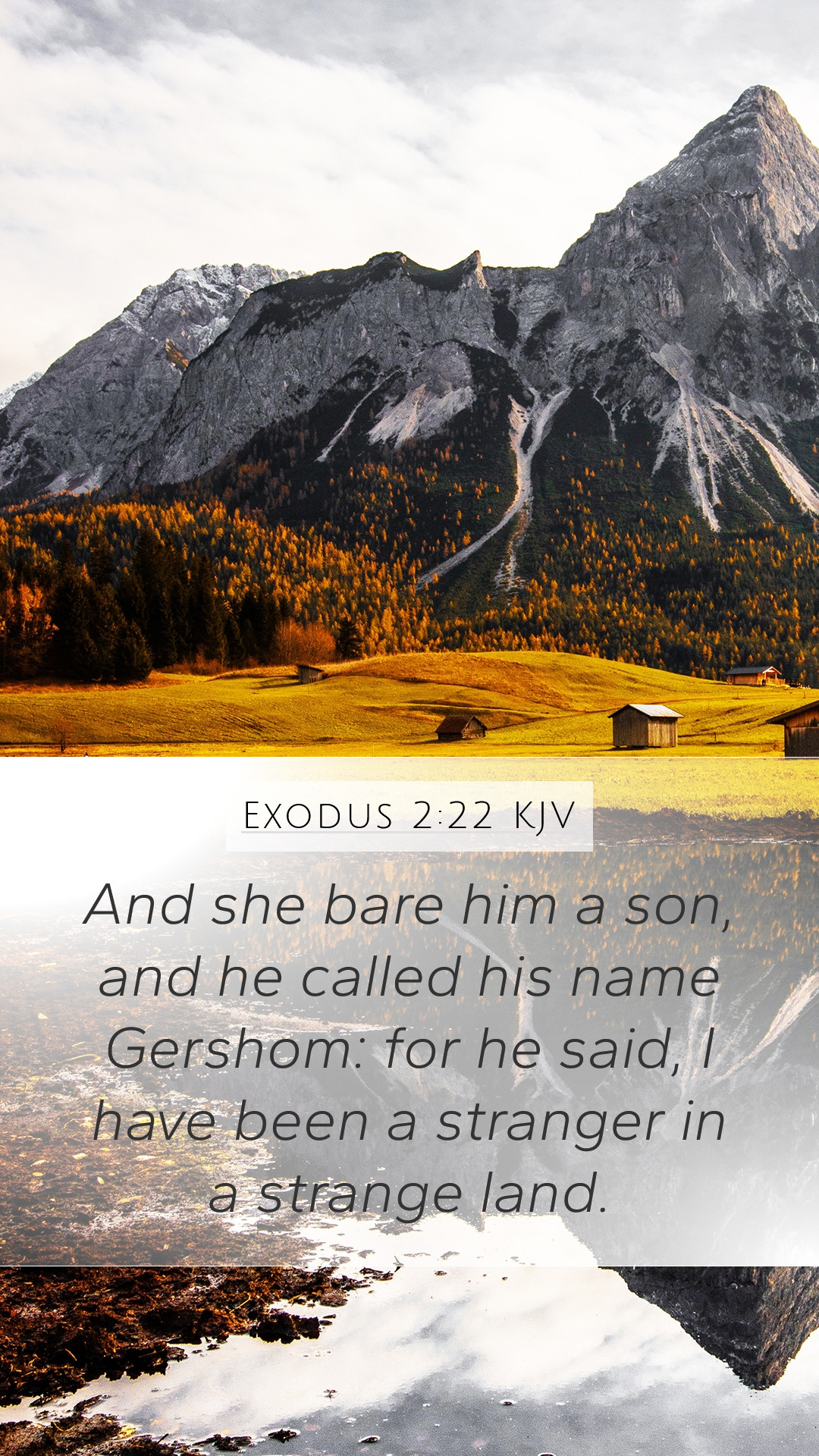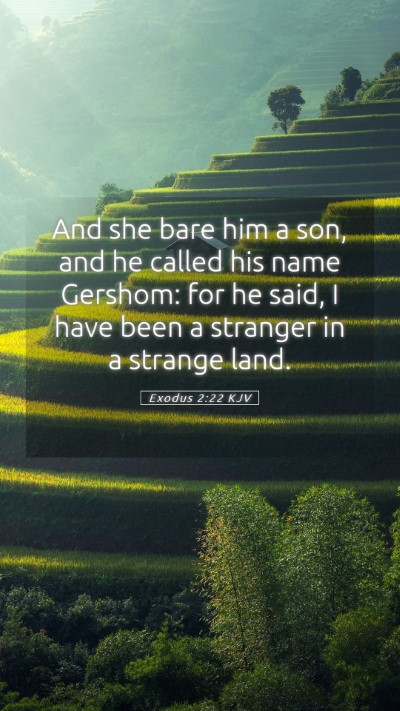Exodus 2:22 - Bible Verse Meaning and Commentary
Verse: "And she bare him a son, and he called his name Gershom: for he said, I have been a stranger in a strange land." (Exodus 2:22, KJV)
This verse encapsulates a significant moment in the life of Moses, reflecting on his identity and experience as an outsider. Let's delve into the meanings and interpretations of this verse from various public domain commentaries.
Understanding Exodus 2:22
In this scripture, Moses names his son Gershom, which translates to "a stranger there," highlighting his feelings of displacement and alienation in Midian. This naming is significant for several reasons:
-
Identity and Heritage:
Moses' choice of name illustrates his deep awareness of his roots and the context of his life. He signifies his Israelite heritage while simultaneously embracing his current reality as a Midianite.
-
Reflection on Experience:
The verse reflects Moses' contemplation of his past as an Egyptian prince versus his present status as a shepherd and foreigner. The phrase "I have been a stranger in a strange land" underscores a common biblical theme of alienation.
-
Historical Context:
Understanding the historical context is crucial. After fleeing Egypt due to his involvement in the death of an Egyptian, Moses finds himself in Midian, where he marries and starts a family, yet he remains haunted by his past.
Bible Verse Commentary from Notable Theologians
Matthew Henry's Commentary
Matthew Henry observes that Moses, by naming his son Gershom, acknowledges his experiences and the providence of God in leading him to Midian. Henry emphasizes the significance of Moses' feelings of estrangement and the formative impact it had on him as a leader who would later bring the Israelites out of slavery.
Albert Barnes' Notes on the Bible
Albert Barnes highlights that the name Gershom not only denotes Moses’s current life situation but also serves as a prophetic reflection of the Israelite liberation journey. Barnes stresses that this moment illustrates God's preparation of Moses for future leadership, underscoring the biblical theme of divine preparation through personal trials.
Adam Clarke’s Commentary
Adam Clarke points out that the naming of Gershom signifies more than mere alienation; it represents a turning point in Moses' life. Clarke explains that this period of being ‘a stranger’ allowed Moses to grow spiritually and seize the wisdom necessary to lead in the future. His experience in Midian becomes an integral part of his personal development.
Further Reflections and Applications
Exodus 2:22 not only has implications for the life of Moses but serves as a reflection for readers. The themes of alienation, identity, and divine providence resonate with many individuals seeking understanding in their own lives.
-
Personal Application:
In a world where many feel like strangers, this verse encourages personal reflection on identity and purpose. Understanding one’s experiences as part of God’s greater plan can lead to spiritual growth.
-
Biblical Context:
Connecting this verse to broader scripture themes enhances understanding. Moses' feelings of displacement parallel many biblical characters who experienced trials leading to divine purposes.
-
Group Study Insights:
This verse can be a focal point in Bible study groups, providing ample opportunity for discussions about identity, purpose, and God's workings in our lives amidst struggles.
Cross References
- Genesis 47:9: Jacob describes his life as a stranger in a foreign land.
- Matthew 2:13-15: Joseph takes Mary and Jesus to Egypt, embodying themes of flight and alienation.
- Hebrews 11:9-10: Reflects on Moses living as a stranger and sojourner, looking forward to a promised land.
Conclusion
Exodus 2:22 serves as a profound reminder of the complexity of identity and the significance of our experiences in shaping who we become. Through Bible verse meanings and interpretations from esteemed theologians, we gain a nuanced understanding of how this passage can reflect our struggles and the overarching narrative of divine purpose in scripture.
For anyone seeking Bible study insights, understanding the rich meanings behind verses like Exodus 2:22 can enhance personal faith journeys and foster deeper connections in Bible study groups.


